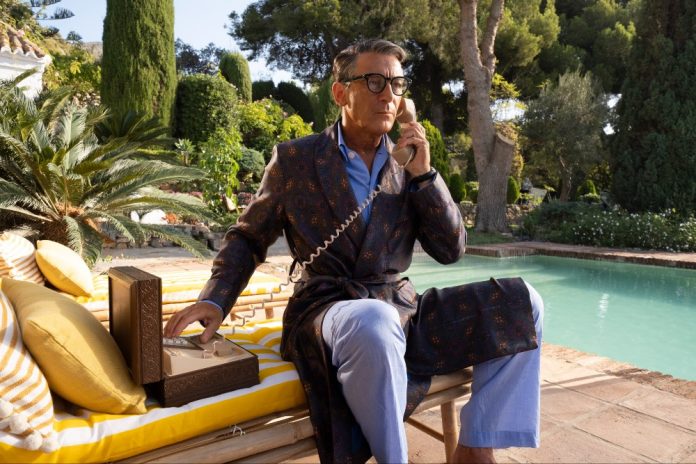The world knew him as the movie star Cary Grant, but underneath his screen persona was the real man, Archibald Alexander Leach, aka “Archie.” In the series Archie, currently streaming on Britbox, Jason Isaacs (Harry Potter and the Chamber of Secrets, The Death of Stalin, Mass, The Patriot) takes on the iconic matinee idol from the inside out, exposing all of his insecurities and false bravado that lied behind his trademark square-rimmed glasses and outward suave and sophisticated appearance.
Based on the memoir “Dear Cary: My Life With Cary Grant” by Dyan Cannon, his fourth wife, Creator Jeff Pope crafted a script, showing how Grant’s troubled childhood, his adulterous father, and his depressed mother shaped him, escaping into a life of adoration in showbusiness. When the role came to Isaacs, he was quite surprised, because he couldn’t see the physical resemblance, but that quickly dissipated when he tapped into his inner life. With the familiar accent and the perpectual deep tan aside, his performance became more about capturing the essence of the man than mimicking him.
Above The Line spoke with Jason Isaacs via Zoom, where he was in New York City, sitting in front of a window with the backdrop of Manhattan behind him, quite a ways away from where Cary Grant made his home in Benedict Canyon, Los Angeles. Isaacs, who enjoys telling stories, discussed portraying Archie Leach and all his foibles, his conversations with Dyan Cannon, along with getting his famous accent down, how he walked, and the makeup process of applying his dark tan and dimpled chin, which he describes all as “an indication” of him. As an executive producer on the project, Isaacs revealed his desire to show the man warts and all, specifically addressing and not sugar-coating his rumored homosexuality.
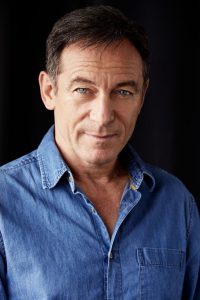
Above The Line: This was so much fun. I loved it, and thought you did a great job. Tell me how the role came to you.
Jason Isaacs: The same way. All the agent calls, they want to offer you something like playing Cary Grant. I went, “You must be out of your mind. Just tell them ‘no,’ and they need to go seek therapy.” He said, “Well, it’s called Archie. It’s written by Jeff Pope.” And I thought, “Jeff Pope? He’s not an idiot. Why would he try to get an actor to play Cary Grant?”
ATL: What changed your mind to say “yes” if you were uncertain about taking on the role?
Isaacs: Then I read the scripts, and of course, it’s not about Cary Grant. It’s about Archie Leach, who was the polar opposite of Cary Grant. Cary Grant was a character he created in some ways to try and solve his terrible, damaged insides and to fill a hole that was left empty from his abusive and catastrophic childhood. It’s a heartbreaking, tragic story about a man tortured by his childhood who can’t hold a relationship down. I thought, “Oh, hold on a second, that’s a bit more interesting.”
ATL: What do you remember about your meeting with the writer of the series, Jeff Pope?
Isaacs: I wanted to meet Jeff Pope, the writer who has a long history of bringing real-life stories to the screen in brilliant fashion, including getting Oscar nominations, BAFTAs, and all the rest of it. I went to see him and talk to him about it, and what became clearer and clearer was that he’d spent 10 years developing this. He was very collaborative and open to stuff, and in the reversal of a normal situation where I go and meet someone and hope they’ll offer me a job, I thought, “I don’t know. Cary Grant. I’m not sure about this.” I left, and he shook my hand and said, “I hope you take the job.”
ATL: What was your process in understanding who Cary Grant was?
Isaacs: I went away, and I started reading about him, learning about him, and realizing this was a really badly scarred man who dealt with just such inner torment. When he got off stage or got off the set, he shut his front door and dropped a mask, and someone entirely different emerged. And I thought, “Well, that sounds like something I’d want to play.” I just had to realize that I know I’m no Cary Grant. But he wasn’t either.
ATL: It’s interesting, because you did more of his essence, rather than mimic him. How did you find your way in? Was it putting on those trademark glasses?
Isaacs: You know, it wasn’t. There’s two things to playing him. One is the craft of walking like him—you know, looking a bit like him. That’s other people who do amazing makeup and hair. I mean, I don’t look like him. I look less like me. It’s an indication. If you want to see Cary Grant, go watch Cary Grant. So there’s the outside, there’s the walking, there’s the talking, and there’s the whole technical thing to do. But really, it’s the inner landscape that’s hard.
ATL: How would you describe portraying that inner landscape?
Isaacs: How do I make this seem truthful? You won’t recognize him from the movies, because he was unrecognizable. If you want to see where the bridge is, go searching for interviews with him. You won’t find any. He didn’t give any. He didn’t want the public to see who he was when the mask dropped. He knew how he was the very polar opposite of everything the audience worshipped him for. The great dramatic irony of his life is that he was so unloved—he was completely abandoned, neglected, and abused when he was a kid—that he spent his whole life trying to make people love him. He was a male escort; he was pretty; he wooed people; he had many relationships; and when he succeeded on a scale no one could ever dream of – which is making literally half the world adore him, worship him, and lust after him – he felt even worse about himself. In love, he got into relationships with men and women and drove them away, making them leave him before they could abandon him like everyone had when he was a kid.
ATL: What was the most difficult part for you?
Isaacs: The difficult part as an actor, apart from the craft on the outside, was to build that on the inside. I did that with the help of every biography and everyone else’s biography who had ever met him, and lots of talking to Dyan Cannon.
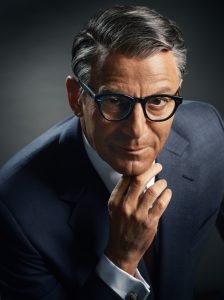
ATL: Tell me about some of those questions that you asked Dyan and also of his daughter, Jennifer, and what you discovered.
Isaacs: Jennifer and Dyan both had been consulted by Jeff, although it’s really Jeff. He had to have the rights from them to tell the story his way, whatever he felt to be true. Otherwise, it would have been horribly compromised. Jennifer remembers a loving doting dad, and she knew him when he had retired from acting. My overly simplified version of what went on, but I think it’s accurate and emotionally accurate, is that he sought love his whole life, and he was never going to get enough love from anyone to fill the hole that was left by the abandonment of his mother, father, and everyone else.
But when he had a kid, he started to give love, and it’s not complicated. I remember when my first daughter was born. I thought, “Finally, I belonged somewhere. All she needs from me is love, and I don’t expect anything from her.” That was the beginning of the healing process for him. Dyan Cannon and her book, “Dear Cary,” will tell you and chronicle it. There are many things she told me that weren’t in the book. Very private things that I won’t be sharing but that were helpful. She was wooed by Cary Grant, but she married Archie Leach, and Archie Leach was a guy who arrived with a whole fleet of pantechnicons [the British word for a large van transporting furniture] of baggage. He had wounds that had not only never healed from childhood, but that he had opened wider and wider by becoming so beloved and feeling so far from the creature he’d created on screen. Dyan had such a terrible time. I kept apologizing to her, apologizing for what she had to go through as a young woman. I’ve got daughters that weren’t very much younger than she was when she married him. She shouldn’t have had to endure this pain. But who was she going to tell? Also, she was committed to marriage. She was born out of her time, really. She thought you married someone for life, and that’s it. She put up with an extraordinarily intense onslaught in every area before finally walking away.
ATL: Did Dyan reveal anything that was helpful to you getting into the role?
Isaacs: I think the question was about research. I lost myself, but she chronicled it for me in such detail with real generosity. Looking back, she took a long time before she wrote a book, and it’s 10 years after the book was made. Before this was made, she’s able to forgive him and still not carry resentment and anger in her heart, because she could see the fault lines going all the way back to his childhood. She knew where his terrible behavior came from. She knew in many ways that he was his own worst enemy, no matter what he did to her.
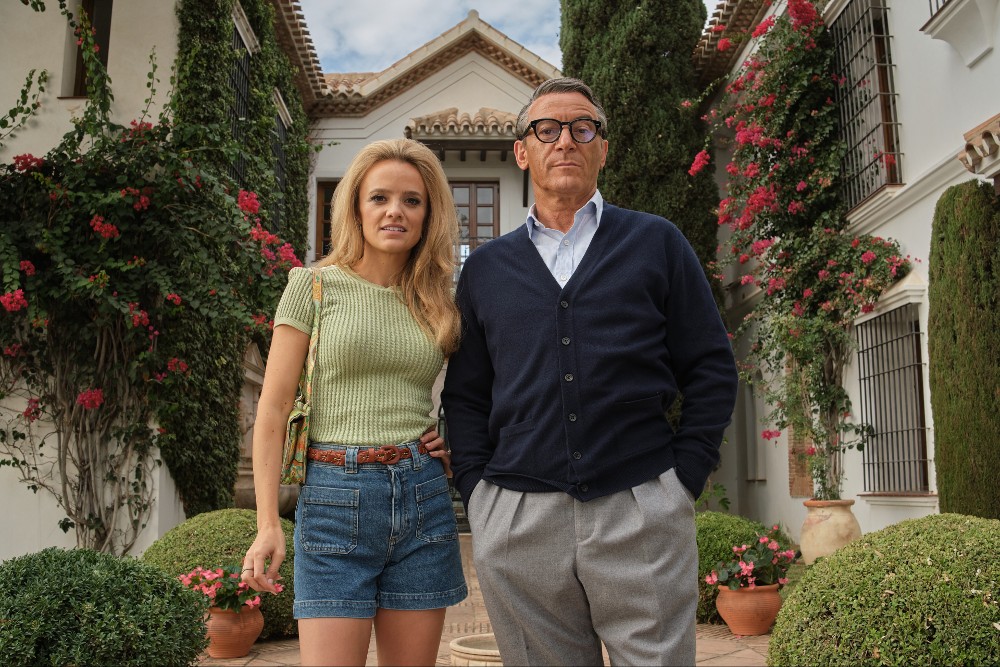
ATL: So in the end, what was the best feedback that you got from the family?
Isaacs: Well, Dyan couldn’t watch a lot of stuff. She found it very, very difficult. These are the chapters she put behind her a long time ago. She wrote a book a long time ago. She’d seen all the dailies. I was with her at the first screening in London; she found a lot of it so evocative and so close to her experience that it was incredibly painful for her, and it made her angry again and sad again. I guess, in an awful way, that’s what I would hope we could do.
ATL: One of the scenes that surprised me what when he was offered James Bond, and I thought that must have been a little tick for you, because weren’t you also offered James Bond in your career?
Isaacs: I do know Dan Craig, who was born to play James Bond. He’s absolutely fabulous. I was never. It’s funny when those things appear in the newspaper somewhere, and it goes to the top five people on the list and puts money on them. I want to write and go, “Don’t put money on me because I know Dan’s playing it!”
ATL: Talk about the reenactment of playing him as an older man, when he is giving those Q&As in front of an audience.
Isaacs: First of all, thank God, Jeff didn’t write a linear biopic like this kind of chronological thing, because he died at 82. You can’t put all that in four hours, mostly because they’re boring. Decades after he retired, he started to do these things on stage, where he just had some conversations and took questions and answers. He was filling in for a friend at first. He quite liked it. I couldn’t believe that people remembered him. He couldn’t believe that people remembered his films and knew what they were, and he was quite flattered by it. He quite liked it, getting easy laughs. He was an entertainer; he was a comedian, but he hadn’t been a comedian for decades. He was just on the boards of big corporations and was very good at it. So anyway, he was doing those things, and he had a stroke—a mean stroke—and it gave Jeff, when he was writing it, a license to create something a little bit more kaleidoscopic. Maybe we’re not really watching him on stage at all. Maybe we’re watching a man dying or having a stroke, and these are the moments from his life that are flashing before him.
ATL: How did the director, Paul Andrew Williams, uniquely frame some of the flashback scenes?
Isaacs: He has a really anarchic creative talent. He went, “Hold on, let’s shoot everything on Super 8 as well.” And I went, “Why?” and he goes, “Let’s just do it.” I don’t know how we’re going to use it. Maybe we won’t use it. He goes, “Let’s do subtext runs, so he screams out the things you’re thinking. I might use them occasionally.” He took actors from across timelines. So I’m talking to my 70-year-old mother, and he brings in the actress who plays my 20-year-old mother. Or I’m in bed with Dyan Cannon, and I roll off her, and it’s under my 14-year-old self. Or even in the theater, people from my past are suddenly sitting in the audience.
ATL: Why did he shoot on Super 8?
Isaacs: Cary Grant was a huge early adopter, like I am. So Jennifer very generously gave me DVD after DVD, where he filmed everything when she was a kid. I filmed the first many years of my children’s lives. I’ve never watched them. They’re in the loft, in a box; no one’s ever going to see them. But early on, he shot things with Howard Hughes. He shot things when he was with Sylvia Scarlett, but they’re silent, and there’s a cinefilm of that stuff. It gave Paul the idea to just capture bits of it, so watching it makes it feel more like a memory. The whole thing is a memory, as much as it’s a recitation.
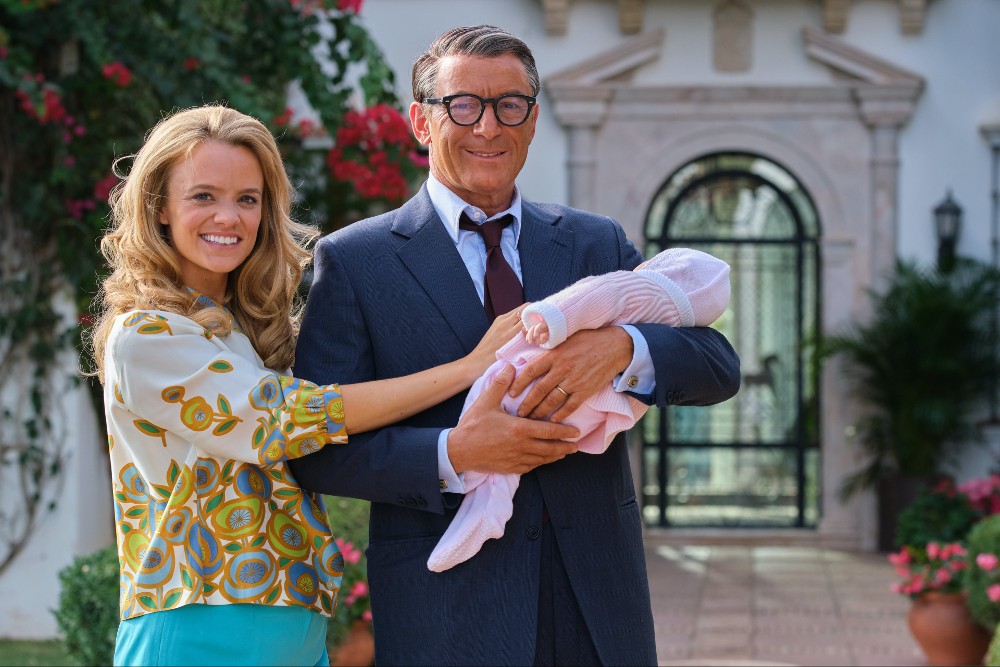
ATL: Describe your makeup and your look. Talk about applying that in the morning and what that felt like to look in the mirror.
Isaacs: It’s the sort of look where there’s an amount of enormous extremes, insecurity, anxiety, and neurosis. So he was told very early on in Hollywood to be brown. You want to be brown. You want to be the brownest person in the film. And my God, did he go that far? He walked around with a triple [sun] reflector the whole time. And he was so dark brown. In Gunga Din, he was darker than the Indians! They tried to overlight him and underlight other people to balance the colors out. But even towards the end of his life, he just wouldn’t listen to anyone. So he was always very, very brown. So I was covered in outdoor furniture polish the entire time, a fake tan that was so mahogany brown, it was absurd. But that’s the color that he was.
ATL: What about recreating his dimpled chin and the rest of his look?
Isaacs: Then he famously had that dimpled chin. Look, just to rewind slightly, I was never going to look like him. I wasn’t trying to look like him. I was just trying to indicate something slightly in that direction. I’ve seen a couple of things online. They’re not professional reviewers, but I stupidly read the comments sometimes on social media, and they’re like, he doesn’t even look like Cary Grant. That’s okay. I do realize I’m not Cary Grant. And believe me, soon there’ll be AI, and Cary Grant will be in films again and actors will be out of work. But right now, it’s me. Anyway, we decided you couldn’t avoid the chin. It’s such a defining feature, but actually the chin, the size he had—if anyone wants to go around Google and look at it—was enormous. It was like a doll’s butt cut off and stuff. So we made it smaller. He had brown eyes, and I had contact lenses. He had different hair and different wigs. When I got older, we had very subtle prosthetics widening my face, which meant four or five hours in the chair, but it’s worth it. It’s just a kind of subtle look. There’s the handmade suits; they’re all tailor-made suits, and then there’s the audience’s suspension of disbelief.
ATL: You kind of took my next question of going from the younger version to the older version and how you found your way there.
Isaacs: I mean, his gait changed. He was an acrobat when he was a kid. He wanted to still be an acrobat and to be bouncy when he was older, but your knees and your elbows go a bit. And his voice changed—his voice got deeper and slightly raspier towards the end of his life, certainly. I did that thing; that is my job. I pretended.
ATL: Did you stay in his accent all the time?
Isaacs: Yeah, I always do that. I just find it much easier because when they say “action,” I’m thinking about what the hell I’m thinking about. My wife is making me jealous, or my mother’s driving me mad. Instead of that, and “Oh, wait, what sound comes out now? What sound comes out here? How do I say this line?” I feel if I chat in the voice, I do it when I’m doing American or I just did Staffordshire in England. But anyway, I find that if you stay in it all day, as much as possible, it may not be good, but it’s consistent.
ATL: Talk about your role as an executive producer. What did you contribute in that capacity to the series?
Isaacs: Well, I went to see Jeff Pope when I’d been offered the job and hadn’t decided to take it, because I thought it was a poison chalice and just going to walk into a sea of knives for me. There were some things that I thought we needed to engage with, one of which was the fact that he had been with men a lot earlier in his life and then was with women later. Jeff and I had a robust debate about whether to include it or not, because there isn’t necessarily proof. Dyan says it wasn’t true, but she didn’t know him when he was young, and Jeff is the most collaborative person. He said, Well, look, we’ll find a way to honor what you think we need to honor, because we don’t want to in any way whitewash things but also stick to what we know to be true. You have a ton of ideas. Why don’t you be an executive producer? And that way, you have an official seat at the table. You’d have a seat at the table anyway, because you’re playing him, but just make you an EP, and then you get to be part of all the creative discussions. He’s just a very open, lovely, creative guy, and that meant that I was given license—maybe more than I would have done as an actor—to mess about on set, to try something, to improvise around.
The brilliant Laura Aikman, who plays Dyan Cannon, is so nimble on her toes as an actress that if I zigged, she zagged, and she would do the same to me. It felt like a very free place; we weren’t nailed down by a script, and Jeff is one of those people who’s unprecious about his writing. Also, as an executive producer, I felt responsible for the mood of the crew. If we’re doing a late-night shoot, just make sure that everyone’s happy, fed, well lubricated, and dancing to music. You want to make sure that everybody around is having a good time because, in the end, we’re just making a television program.
Archie is available to stream via BritBox.


